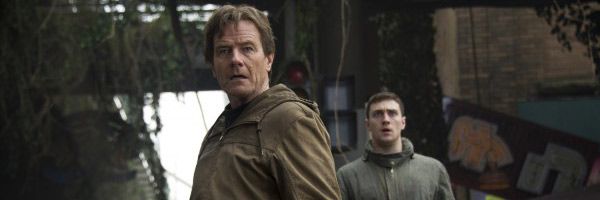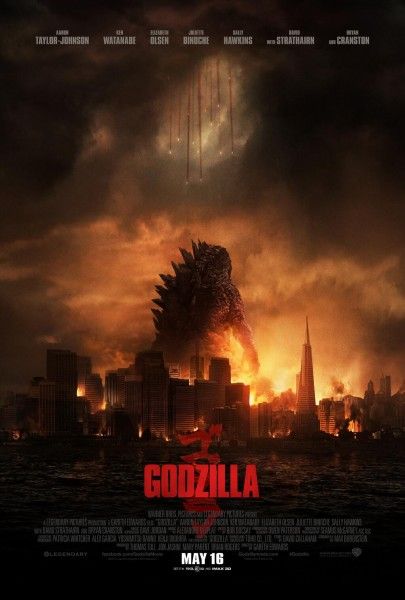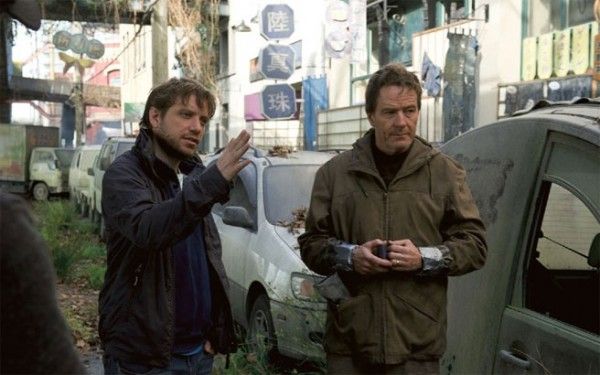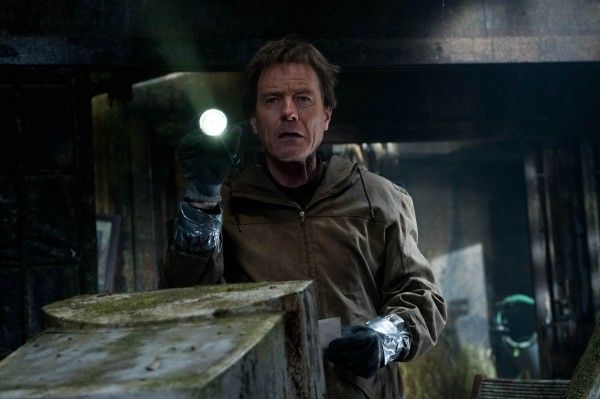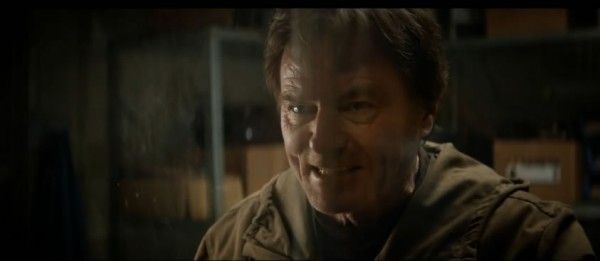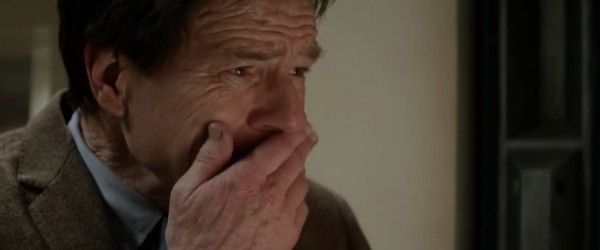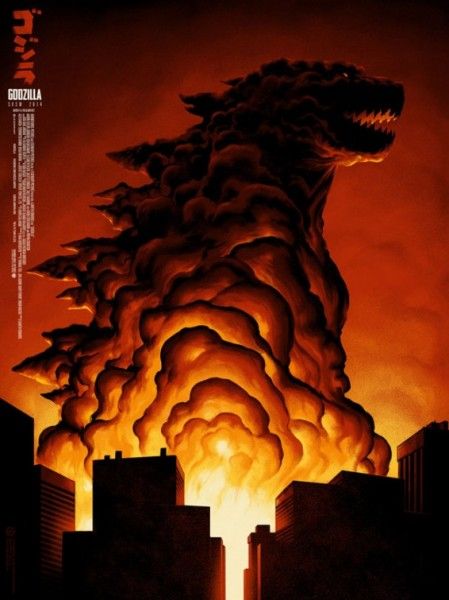I've been doing this job for about seven years now, and Bryan Cranston is easily one of my favorite interviews. He has all of the confidence of someone who has worked hard to get where he is, but none of the ego. Last year, some fellow journalists and I went to the set of Godzilla, and Cranston was an absolute joy to talk to. He was smart, funny, nice, and came over multiple times during the day to speak with us.
During our conversations, we talked about his character (a scientist who's the father of Aaron Taylor-Johnson's character), the man-vs-nature theme, the action scenes, how Godzilla was his favorite monster growing up, working with director Gareth Edwards, and much more. Hit the jump to check out the Bryan Cranston interview. Godzilla opens in 2D, 3D, and IMAX 3D on May 16th.
Even though your character is a scientist, do you get to see any action scenes at all?
BRYAN CRANSTON: Oh, I see some action. Oh yeah, I do, I see some action. Some ‘hot scientist’ action! Some ‘scientist on scientist’ action. You can’t miss it! Sometimes there’s some ‘three-way’ scientist action. Oh yeah.
Do you get close to Godzilla at some point in the film, or is it always from a distance?
CRANSTON: He’s in his trailer. That guy, such an asshole. I gotta’ tell you, when he gets on the set, he delivers though, so I see why he keeps coming back to make movie after movie, because he’s good. He’s just a prick.
What would Malcolm in the Middle do with Godzilla?
CRANSTON: We would honor Godzilla, as the alpha of the group.
Are we cutting back and forth (in time) to a larger military presence between two different stories?
CRANSTON: It’s more linear. It goes up to, when his (Aaron Taylor-Johnson’s) character of ‘Ford’ as a boy, when this eruption starts to happen, and the scientific discovery, and then there’s a big situation that happens that catapults us to the next jump in time, and that’s when we pick up the story in 2014, and that’s when he’s a grown man with his own family.
In the original (1954) film, the scientist character almost has sympathetic feelings towards Godzilla. Does your character have any feelings about what to do about him?
CRANSTON: Curiosity is insatiable. The militarist point of view is, “Kill it! I don’t understand it!’ But we have a different point of view which is fascinating, that is fascinating to us.
Would you be able to say if your character is possibly repenting for past sins?
CRANSTON: I don’t know about that, but there is regret. I think it’s very relatable, because you get to middle-age or beyond and you start evaluating how you lived your life, and you realize, like my daughter is already twenty and in college, and I can’t for the life of me know how fast that went, and so you do. You look back and you go, ‘Yeah, there were sacrifices,’ so there were a lot of opportunities and great things, but then you miss a couple of things about growing up. So there is that. He is experiencing that type of regret.
Here (director Gareth Edwards) obviously has a lot riding on his shoulders technically, but how is he with actors?
CRANSTON: He’s remarkably calm. I always look for someone who has a clear vision, and yet is malleable, so that the vision isn’t set in stone, rigid, ‘my way or the highway’ kind of thing, which you do run up against sometimes. I think it would be shooting yourself in the foot, because the triumvirate of writer, actor and director is what you want. You want everybody working at that level, so by having a director who welcomes dialogue, in this case from the actor to director, ideas, input and that sort of thing, and embraces it, then it just spawns more of that. It gives actors a sense that they are valued. Not just that, ‘You know, you can do this and step here,’ but that your opinions are valued coming in. So before I even signed on, I had two very lengthy conversations over the phone when I was still shooting ‘Breaking Bad.’ At first I was a little reticent, just because of the overall nature of it, and I think I was also feeling a little bit of, ‘Oh, I have to protect this now,’ because I was coming off of a very well-written show with a very compelling storytelling, that it’s going to be compared, whatever I do. Then I thought that I didn’t want to be a prude about it either. I want to be able to embrace the largesse of it, the uniqueness of it, and the fun! I don’t want to say, ‘Oh no no, that’s not high-brow in any regard!’ But what won me over is the story-line and Gareth’s commitment. He came after me, we talked, and I told him the initial problems I had with the script, and then we started talking some more, and then pretty soon, if you are not careful, as an actor you start to take ownership of it, and then you are sunk.
Having directed yourself on television, what’s that like (with this)?
CRANSTON: I have a bad habit of inserting my ideas into shots and things. I don’t know, I don’t hold back on suggesting things, but I don’t have any connection to what actually happens, so I’ll make a suggestion on something and then just let it go. If it works fine, and if it doesn’t I’ll do whatever we do. I think that’s what works best in the collaborative art form, is that you just put it out there without having an attachment to the outcome.
That said, we asked Gareth if the word ‘Godzilla’ was actually ever uttered in the film, and he said that they were going to try it on for size and to see if it fits. Have you done it yet?
CRANSTON: I haven’t said the word. I’m not allowed to. What’s funny is that there was a lot of secrecy about the whole thing, and early on they were calling it Nautilus, so I’m going through Canadian immigration, and trying to get my paperwork, and the guy was very efficient. ‘What are you working on?’ ‘A movie.’ ‘What’s the name of the movie?’ ‘Nautilus.’ And that’s when his eyes went up. ‘You mean Godzilla.’ And I go,’ Yeah.’ But he even he knew!
Is there’s something exciting or fantastic for you that you are in a Godzilla movie?
CRANSTON: I love Godzilla! What I loved as a boy was Godzilla more than King Kong, because he just destroyed everything without any apologies. I did. I loved it! And then later on, I heard the story about the (American producer Joseph E. Levine) who bought this Japanese film (1954’s Godzilla) and was going to release it in the States but he knew it wasn’t going to fly, so he hired writers and (actor) Raymond Burr as a reporter and they shot a bunch of stuff and just inserted him throughout the movie and they released it (as Godzilla, King of the Monsters! In 1956) and that’s how he made his fortune.
You mentioned earlier that you had notes on the script, and things you wanted adjusted early on.
CRANSTON: It’s hard to say. As you know, there are a lot of writers on this. I don’t know who did what, and whose sensibility was woven through. There were some minor things, just points of view. For instance there was a thing where my character assumes that my son is going to go with me on this dangerous excursion, and I just thought that was wrong. It was an easy fix. Nothing that I raised was, ‘Oh no, we have to draw the line there!’ And then I proposed a couple of things, like just more, like more (of a) broad stroke kind of sentiment. Like that song when I was a kid, ‘The Cats in the Cradle.’ You know where, ‘I’m going to grow up just like him Dad.’ And then I pitched it, it was there, it was already there, but I suggested that we do a handshake, that I shake hands with my son when I haven’t seen him in a while, and that that ALSO happens with his son. (Because) his son hasn’t seen him in a little while and he’s a little trepidatious about who this man is. So it has an effect on ‘Ford Brody’ the character like, ‘What am I doing in my life, where the people in my life I’m close to shake my hand as opposed to hug me?’ So that was kind of a theme that we got upon and really tried to revisit every now and again. So that’s just an example of just a nice layer that’s in there that makes it more than just an epic spectacle kind of thing.
Have you done any of the epic point of view shots of you looking at Godzilla, and if so, what was that like for you as an actor?
CRANSTON: It’s like a laser pointer. ‘OK, see where the laser is now on the green screen?’ That’s part of an actor’s bag anyway, is just imagination. You pull out what you need if you don’t have personal experience, and imagine it. I think it was probably easier for my generation too, because we got bored easily in the back seat of a station wagon and there was nothing to do and you had to just daydream. I never thought that my extensive daydreaming catalogue would actually come in handy someday, and it really has. It’s interesting, because I wonder if this new generation that has instant entertainment at every turn will in a sense fully develop an imagination, or will it be derivative of what they see that’s hitting them all of the time, because they don’t have a chance to wonder on their own.
How do you feel the human dynamic of the story is working with the man vs. nature element?
CRANSTON: I think that kind of contrast can exist together. I always thought that when you saw a movie that had one element that they focused on and ignored the human element, I thought they were just lazy. I just always do. It’s not really my thing. And if this movie didn’t have a character component to it, I wouldn’t be here. It just doesn’t interest me.
We know that Elizabeth Olsen plays the wife of Aaron Taylor-Johnson’s character. Do you have any interaction with her, and does she share his bitter feelings towards you?
CRANSTON: He has a great bit of resistance towards me, because of our past, and she plays the peace-maker. You know, ‘He’s your father, you have to do the right thing.’ So we have that kind of a relationship, and it’s good. And Juliette Binoche plays my wife, and I rewrote a lovemaking scene, and submitted that. You know, just back-story. Let’s be as honest as we can. It didn’t make it into the script, so then I suggested, ‘You wanna’ work on the scene outside of set?’
What do you think about the new design of Godzilla? Were you pleased by it?
CRANSTON: My god, yeah! Actually, the new design is basically back to an old design, I think. The scale surprised me. The extreme size of it compared to the MUTOs that they are fighting. Even that! When you see the MUTO it’s enormous, but it’s not nearly as big as Godzilla.
Would you say this film is anti-nuclear energy, because it feels like a Three Mile Island thing, like a throwback to the ‘70’s.
CRANSTON: I think more than that. I don’t really think it’s really making a statement in that sense. Society as a given accept the inherent dangers of nuclear power. They know that it’s always been that way. It’s fine if nothing goes wrong, but things go wrong. In my state of California, San Onofre nuclear power plant was just closed down because it’s leaking. So they closed it down completely, and these are problems. So I think more than trying to make a political statement, it’s something that immediately a wide-ranging audience can relate (to). If there’s a problem there, there’s a big problem, and it’s intensified and exacerbated to the point where it could be catastrophic.
What's it been like working with Gareth?
CRANSTON: He’s quite remarkable for a young lad. You know, given the circumstances, after Monsters, and then coming to do this monster budget film, he has every right to freak out that, and just break out in hives, but he’s amazingly calm; frighteningly so.
What can you tell us about the scene you're filming today?
CRANSTON: I go into my old office searching or something specific, something that’s alive.
Can you tell us about your character in the film?
CRANSTON: He’s a nuclear physicist, which my other character knew something about, borrowing from other character Heisenberg’s occupation. He works at this nuclear power plant as an independent contractor, who is brought in to oversee the structural significance of the building itself, and then he notices there’s an anomaly to some recordings that are happening; seismic activity. It’s baffling, because it’s not irregular as an earthquake would be random. This is steady and pulsating. So he starts to investigate and he’s just trying to wrap his head around it when all hell breaks lose.
Is he aware of a Godzilla like creature from the past, from the 1950’s?
CRANSTON: That’s the furthest thing from his mind right now. He thinks it’s geological pheonomon, and then he comes to realize, but to late, that it’s not, and that it’s biological.
The setup seems very old school 1950’s monster movie. In your mind, what is Gareth doing with the story to make it fresh and contemporary?
CRANSTON: The reason I’m here is because this story in interestingly driven by strong character motivations. If you saw his movie Monsters, which is one of the things that got me involved in conversations, it was like a character-driven monster movie, and I’m much more attracted to character-driven pieces, from the ‘old school’ perhaps, where you actually want to care about and invest in the characters, and root for them or hate them or whatever, and there is very strong father-son component to this, and my character makes huge, sweeping decisions that reverberate throughout the rest of the story, that are emotional as well, which is really w hat brought me here.
Talk about the journey from 1954 to 1999 to 2014, and how your character gets there.
CRANSTON: I can’t. It’s not that I won’t, I really can’t. They are separate stories, as far as what I understand, there’s not a through-line to a character.
Does this story start in 1954?
CRANSTON: To give you a little historic perspective to what may be the genesis of what becomes the initial problem in this story, and then it moves up to 1999, and again to 2014, and there is a definitive through-line to that. My character Joe?, especially at this time, is experiencing a frustrating anamolly happening in his work that he just can’t give a scientific answer to. As a scientist you are compelled to always go back to the science of things, that there’s a logical answer for every cause, you know, and with this there doesn’t seem to be and it’s just driving him crazy. And the consequence is that he has, as many of us, which I related to, the idea of diving into your work and seeing it, against the forest through the trees, which takes priority, so there is that sense of missing out on some of the upbringing of your child, and then you learn to regret it afterwards.
How does your character factor into the theme of ‘man vs. nature’?
CRANSTON: You know, he’s a man of science, so it’s all about how science can give answers to protect man, really more than the nature of things. You know, one of the things I thought about is that as a man who works in the nuclear energy industry, he’s OK with that. It’s not an issue for him. So as far as being able to come to terms with that, I think he’s fine with it. And I think that’s a prevailing thought with most people in that industry, is that the gain outweighs the risk, or does it?
Click on the corresponding links for more of my Godzilla set visit coverage:
- Matt Visits the Set of GODZILLA and Witnesses the Monster's Trail of Destruction
- Aaron Taylor-Johnson Talks the Tone of the Picture, the Raw Energy During Filming, and More on the Set of GODZILLA
- Director Gareth Edwards Talks Making the Leap from an Indie to a Blockbuster, Man-vs-Nature, Easter Eggs, and More on the Set of GODZILLA
- Legendary Pictures CEO and Producer Thomas Tull Talks GODZILLA, His Love for the Character, Handling Comic-Con, PACIFIC RIM 2, and More

